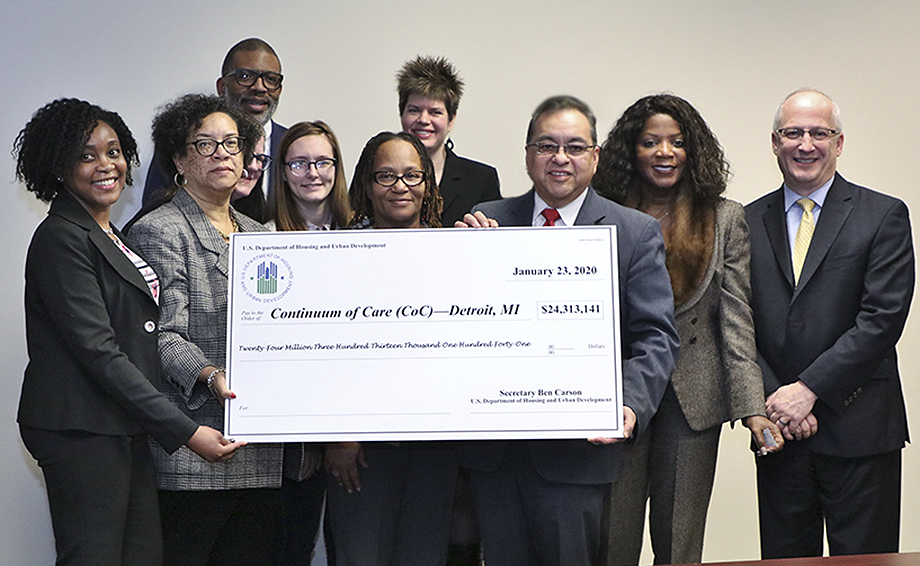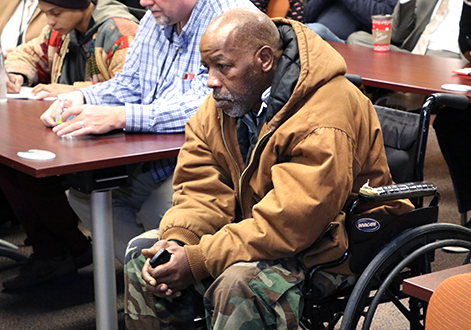|
HUD
awards
over
$73M to
help
end
homelessness
in
Michigan
including
$25M in
Detroit
Federal
grants
to help
a total
of 274
homeless
assistance
programs
statewide
DETROIT,
MI –
U.S.
Department
of
Housing
and
Urban
Development
(HUD)
Secretary
Ben
Carson
announced
nearly
$2.2
billion
in
grants
to
support
thousands
of local
homeless
assistance
programs
across
the
nation.
HUD's
Continuum
of Care
grants
will
provide
critically
needed
support
to
approximately
6,593
local
programs
across
the
country
that are
on the
front
lines,
serving
individuals
and
families
experiencing
homelessness.
This is
the
first of
two
announcements
of
Continuum
of Care
awards.
Nearly
$73.4
million
was
awarded
across
Michigan
to
support
274
programs
serving
individuals
experiencing
homelessness.
View a
complete
list of
all the
state
and
local
homeless
projects
awarded
funding.
"A safe,
affordable
place to
call
home is
key when
creating
a path
toward
opportunity
and
self-sufficiency,"
said
Secretary
Carson
in
Columbus,
where he
made the
funding
announcement.
"The
grants
awarded
today
help our
partners
on the
ground
to
reduce
homelessness
in their
communities
and help
our most
vulnerable
neighbors."
HUD
Continuum
of Care
grant
funding
supports
a broad
array of
interventions
designed
to
assist
individuals
and
families
experiencing
homelessness,
particularly
those
living
in
places
not
meant
for
habitation,
located
in
sheltering
programs,
or at
imminent
risk of
becoming
homeless.
Each
year,
HUD
serves
more
than a
million
people
through
emergency
shelter,
transitional,
and
permanent
housing
programs.
HUD
continues
to
challenge
state
and
local
planning
organizations
called
"Continuums
of Care"
to
support
their
highest
performing
local
programs
that
have
proven
most
effective
in
meeting
the
needs of
persons
experiencing
homelessness
in their
communities.
“Local
agencies
across
Michigan
have
worked
diligently
to end
homelessness
resulting
in
nearly a
-34.3.3%
reduction
in
overall
homelessness
since
2010,”
said HUD
Midwest
Regional
Administrator
Joseph
P.
Galvan.
“We hope
to keep
the
momentum
going
and are
here to
support
agencies
in their
tireless
efforts
to end
homelessness
as we
know
it.”
Detroit
Mayor
Mike
Duggan
said,
“HUD has
been a
great
partner
in our
community-wide
efforts
to
better
serve
our
homeless
population
and
provide
more
pathways
out of
homelessness.
I am
deeply
appreciative
to
Administrator
Galvan
and the
HUD
staff
for this
funding
and
confidence
in our
ability
to put
it to
effective
use.”
“While
we can
count
the
amount
of
resources
the
partnership
with HUD
brings
to our
community,
the
impact
is
immeasurable
to
people
who once
slept on
the
streets,
but now
have a
safe and
warm
place of
their
own.
These
resources
are not
only a
benefit
to our
community.
They
changed
lives,”
said
Tasha
Gray,
Executive
Director,
Homeless
Action
Network
of
Detroit
(HAND),
the lead
agency
for the
Continuum
of Care
for
Detroit,
Hamtramck,
and
Highland
Park.
In 2019,
most of
the
country
experienced
a
combined
decrease
in
homelessness
but
significant
increases
in
unsheltered
and
chronic
homelessness
on the
West
Coast,
particularly
California
and
Oregon,
offset
those
nationwide
decreases,
causing
an
overall
increase
in
homelessness
of 2.7
percent. HUD's
2019
Annual
Homeless
Assessment
Report
to
Congress found
that
567,715
persons
experienced
homelessness
on a
single
night in
2019, an
increase
of 2.7
percent
since
2018 but
nearly
11
percent
decline
since
2010.
The
number
of
families
with
children
experiencing
homelessness
declined
5
percent
from
2018 and
more
than 32
percent
since
2010.
Local
communities
also
reported
a
continuing
trend in
reducing
veteran
homelessness
across
the
country—the
number
of
veterans
experiencing
homelessness
fell 2.1
percent
since
January
2018 and
by 50
percent
since
2010.
View a
complete
list of
all the
state
and
local
homeless
projects.

|







